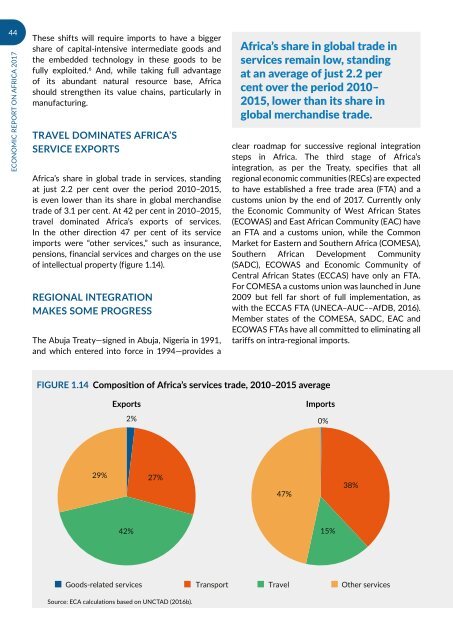URBANIZATION AND INDUSTRIALIZATION
Economic%20Report%20on%20Africa%202017%20UNECA
Economic%20Report%20on%20Africa%202017%20UNECA
Create successful ePaper yourself
Turn your PDF publications into a flip-book with our unique Google optimized e-Paper software.
44<br />
ECONOMIC REPORT ON AFRICA 2017<br />
These shifts will require imports to have a bigger<br />
share of capital-intensive intermediate goods and<br />
the embedded technology in these goods to be<br />
fully exploited. 6 And, while taking full advantage<br />
of its abundant natural resource base, Africa<br />
should strengthen its value chains, particularly in<br />
manufacturing.<br />
TRAVEL DOMINATES AFRICA’S<br />
SERVICE EXPORTS<br />
Africa’s share in global trade in services, standing<br />
at just 2.2 per cent over the period 2010–2015,<br />
is even lower than its share in global merchandise<br />
trade of 3.1 per cent. At 42 per cent in 2010–2015,<br />
travel dominated Africa’s exports of services.<br />
In the other direction 47 per cent of its service<br />
imports were “other services,” such as insurance,<br />
pensions, financial services and charges on the use<br />
of intellectual property (figure 1.14).<br />
REGIONAL INTEGRATION<br />
MAKES SOME PROGRESS<br />
The Abuja Treaty—signed in Abuja, Nigeria in 1991,<br />
and which entered into force in 1994—provides a<br />
Africa’s share in global trade in<br />
services remain low, standing<br />
at an average of just 2.2 per<br />
cent over the period 2010–<br />
2015, lower than its share in<br />
global merchandise trade.<br />
clear roadmap for successive regional integration<br />
steps in Africa. The third stage of Africa’s<br />
integration, as per the Treaty, specifies that all<br />
regional economic communities (RECs) are expected<br />
to have established a free trade area (FTA) and a<br />
customs union by the end of 2017. Currently only<br />
the Economic Community of West African States<br />
(ECOWAS) and East African Community (EAC) have<br />
an FTA and a customs union, while the Common<br />
Market for Eastern and Southern Africa (COMESA),<br />
Southern African Development Community<br />
(SADC), ECOWAS and Economic Community of<br />
Central African States (ECCAS) have only an FTA.<br />
For COMESA a customs union was launched in June<br />
2009 but fell far short of full implementation, as<br />
with the ECCAS FTA (UNECA–AUC––AfDB, 2016).<br />
Member states of the COMESA, SADC, EAC and<br />
ECOWAS FTAs have all committed to eliminating all<br />
tariffs on intra-regional imports.<br />
Figure 1.14 Composition of Africa’s services trade, 2010–2015 average<br />
Exports<br />
2%<br />
Imports<br />
0%<br />
29%<br />
27%<br />
47%<br />
38%<br />
42%<br />
15%<br />
Goods-related services Transport Travel Other services<br />
Source: ECA calculations based on UNCTAD (2016b).


